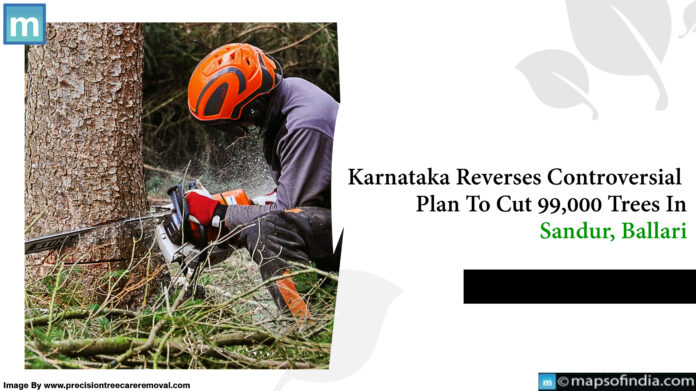The Karnataka government recently made headlines by reversing a controversial decision to cut down 99,000 trees in Sandur, Ballari. The initial plan had sparked widespread outrage among environmentalists, local communities, and concerned citizens. This move is seen as a significant victory for the state’s environmental conservation and sustainable development. Explore Karnataka’s recent decision to suspend plans for cutting 99,000 trees in favour of mining activities. Below are the reasons behind this significant environmental and policy shift and its potential impacts.
Background Of The Proposed Plan
The initial plan to cut down 99,000 trees in Sandur, Ballari, was part of a larger development project to expand mining activities in the region. Sandur is known for its rich mineral resources, particularly iron ore, which has attracted numerous mining companies. The government had argued that expanding mining operations would boost the local economy and create job opportunities for the residents.
Public Outcry And Environmental Concerns
The announcement of the tree-cutting plan led to widespread protests and public outcry. Environmental activists, local communities, and concerned citizens opposed the project. They argued that the government should prioritise sustainable development and find alternative ways to boost the economy without causing irreversible environmental damage.
Government’s Decision To Reverse The Plan
In response to the mounting pressure and public outcry, the Karnataka government reversed its decision to cut down the 99,000 trees. The Forest Minister, Eshwar Khandre, issued a directive to halt the transfer of forest land to the Kudremukh Iron Ore Company Limited (KIOCL) for mining operations.
Khandre cited complaints about KIOCL’s failure to comply with the directions of the Centrally Empowered Committee (CEC) over violations in the Kudremukh National Park. He also highlighted the potential environmental impact of the mining project, stating that it would destroy 99,330 trees and cause severe soil erosion and flooding.
Compensation And Mitigation Measures
The Karnataka Forest Department has been tasked with conducting a comprehensive environmental impact assessment (EIA) to evaluate the potential consequences of future development projects in the area. This move aims to ensure that all stakeholders, including environmental experts, local communities, and industry representatives, are consulted before making decisions.
Implications For Future Development Projects
The reversal of the tree-cutting plan in Sandur, Ballari, sets a precedent for prioritising environmental conservation and sustainable development over short-term economic gains. The government has made it clear that it will not compromise the environment for development and will explore alternative ways to achieve economic growth.




